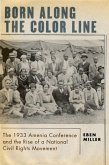By the end of World War II, many black citizens viewed service in the segregated American armed forces with distaste if not disgust. Meanwhile, domestic racism and Jim Crow, ongoing Asian struggles against European colonialism, and prewar calls for Afro-Asian solidarity had generated considerable black ambivalence toward American military expansion in the Pacific, in particular the impending occupation of Japan. However, over the following decade black military service enabled tens of thousands of African Americans to interact daily with Asian peoples-encounters on a scale impossible prior to 1945. It also encouraged African Americans to share many of the same racialized attitudes toward Asian peoples held by their white counterparts and to identify with their government's foreign policy objectives in Asia.
In Black Yanks in the Pacific, Michael Cullen Green tells the story of African American engagement with military service in occupied Japan, war-torn South Korea, and an emerging empire of bases anchored in those two nations. After World War II, African Americans largely embraced the socioeconomic opportunities afforded by service overseas-despite the maintenance of military segregation into the early 1950s-while strained Afro-Asian social relations in Japan and South Korea encouraged a sense of insurmountable difference from Asian peoples. By the time the Supreme Court declared de jure segregation unconstitutional in its landmark 1954 Brown v. Board of Education decision, African American investment in overseas military expansion was largely secured. Although they were still subject to discrimination at home, many African Americans had come to distrust East Asian peoples and to accept the legitimacy of an expanding military empire abroad.
In Black Yanks in the Pacific, Michael Cullen Green tells the story of African American engagement with military service in occupied Japan, war-torn South Korea, and an emerging empire of bases anchored in those two nations. After World War II, African Americans largely embraced the socioeconomic opportunities afforded by service overseas-despite the maintenance of military segregation into the early 1950s-while strained Afro-Asian social relations in Japan and South Korea encouraged a sense of insurmountable difference from Asian peoples. By the time the Supreme Court declared de jure segregation unconstitutional in its landmark 1954 Brown v. Board of Education decision, African American investment in overseas military expansion was largely secured. Although they were still subject to discrimination at home, many African Americans had come to distrust East Asian peoples and to accept the legitimacy of an expanding military empire abroad.
Dieser Download kann aus rechtlichen Gründen nur mit Rechnungsadresse in A, D ausgeliefert werden.









